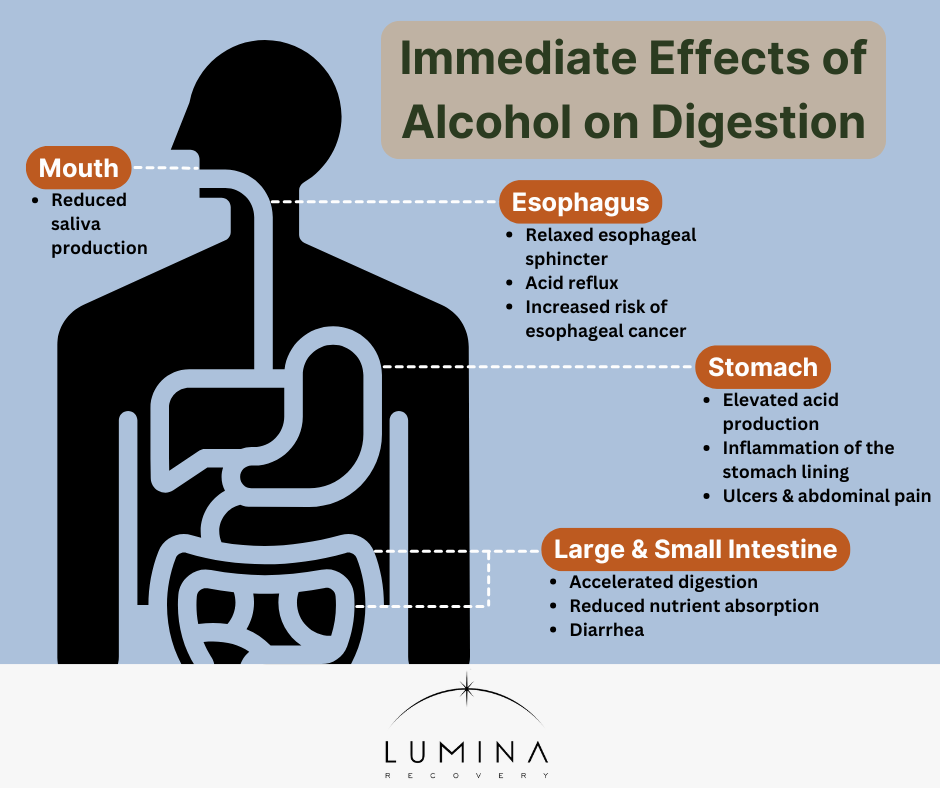The effects of alcohol on the digestive system can lead to serious health issues. Alcohol can irritate the stomach lining, interfere with nutrient absorption in the intestines, and contribute to liver and pancreatic diseases.
Whether you struggle with heavy drinking or care for someone with a drinking problem, knowing these impacts is vital. Understanding how the amount of alcohol consumed affects the digestive tract, from immediate irritation to long-term complications, can help reduce the risk of developing severe conditions.
Overview of the Digestive System
The digestive system breaks down food and absorbs nutrients. It comprises key organs:
- Mouth: Chews food and mixes it with saliva
- Esophagus: Moves food to the stomach
- Stomach: Uses acids and enzymes to digest food
- Small Intestine: Absorbs nutrients
- Large Intestine: Absorbs water and forms waste
- Liver: Detoxifies substances and produces bile
- Pancreas: Creates digestive enzymes and hormones
- Gallbladder: Stores bile for fat digestion
Each part plays a role in keeping your body nourished, but alcohol can disrupt this balance.

Immediate Effects of Alcohol on Digestion
Right after you consume alcohol, your body experiences immediate changes that can set the stage for further digestive problems.
Mouth and Esophagus
When you drink, alcohol immediately reduces saliva production in your mouth. It also relaxes the esophageal sphincter, the muscle that stops stomach acid from rising. This disruption can lead to acid reflux, which over time increases the risk of developing esophageal cancer.1
Stomach
In the stomach, alcohol increases acid production. This extra acid can cause inflammation of the stomach lining, leading to ulcers and abdominal pain.1 Alcohol-induced damage can compromise the stomach’s natural defenses, making it vulnerable to further injury.
Small and Large Intestine
Alcohol speeds up digestion in the small intestine, reducing nutrient absorption.2 The rapid transit through the digestive tract can also lead to diarrhea, as the large intestine does not have enough time to absorb water properly. Even one episode of excessive alcohol consumption can upset this balance.
Long-Term Effects of Chronic Alcohol Consumption
Over time, the cumulative impact of alcohol can create lasting changes in your body that severely compromise the digestive system.
Liver
Chronic heavy drinking is a major risk factor for liver disease. Repeated exposure to high amounts of alcohol increases the risk of developing conditions like fatty liver, hepatitis, and ultimately cirrhosis. Over the long term, such damage impairs the liver’s ability to detoxify the body.
Pancreas
The pancreas is also vulnerable. Prolonged drinking can trigger acute pancreatitis, a painful condition that inflames the pancreas and disrupts its function. Recurrent episodes may lead to lasting damage, complicating digestion and blood sugar regulation.
Increased Cancer Risks
Alcohol disrupts normal cell cycles, leading to chronic inflammation and damage to your DNA. When DNA is harmed, cells may begin to grow uncontrollably, and it increases the risk of developing various cancers. The presence of alcohol in the mouth also makes it easier for cells to absorb carcinogens, further raising the risk of developing cancer.3
Alcohol’s Impact on the Gut Microbiome
There is a strong relationship between gut health and alcohol addiction because alcohol alters the gut microbiome. This community of bacteria is essential for digestion and overall health. Excessive alcohol consumption can cause dysbiosis, where harmful bacteria outnumber the beneficial ones.4
This imbalance may lead to a “leaky gut,” potentially triggering systemic inflammation that can worsen digestive problems over time.4
5 Factors Influencing Alcohol’s Effects
Several factors shape how alcohol affects your digestive system and body:
- Type of beverage. Different drinks, whether beer, wine, or spirits, have unique properties that can influence the digestive system.
- Amount of alcohol. The more you drink, the greater the immediate and long-term effects of alcohol.
- Drinking patterns. Heavy drinking or binge drinking sharply increases the risk of digestive damage.
- Individual health. Pre-existing conditions, such as irritable bowel syndrome (IBS) or celiac disease, can make the effects of alcohol even more severe.
- Duration. The long-term impact of regular alcohol use compounds over time, escalating the risk of serious health issues.
Understanding these factors can help you make smarter choices about your drinking habits.
Recognizing Symptoms of Alcohol-Related Digestive Issues
It’s important to spot the warning signs early. Common symptoms include:
- Nausea and vomiting
- Abdominal pain
- Bloating and gas
- Changes in bowel habits
- Acid reflux
If these symptoms persist, seek medical advice promptly.

Treatment and Management of Alcohol-Induced Digestive Disorders
If you experience ongoing digestive issues related to alcohol, there are several treatment options available to help you regain control of your health.
Medical intervention may include the prescription of medications to manage symptoms such as abdominal pain and acid reflux. In severe cases, hospitalization might be necessary.
Alongside this, a balanced diet rich in vitamins and probiotics plays a vital role in restoring gut health, particularly in the small intestine. Lifestyle changes, including reducing or eliminating alcohol consumption, are crucial for long-term improvement, and counseling or support groups can provide guidance to help you develop healthier habits.
Regular monitoring with ongoing check-ups also ensures that any early signs of complications are promptly addressed, keeping you on track toward recovery.
FAQs
How does alcohol consumption lead to stomach ulcers?
Alcohol increases acid in the stomach, causing inflammation of the stomach lining that erodes its protective barrier, resulting in ulcers and abdominal pain.1
Can drinking alcohol cause diarrhea?
Yes. Alcohol speeds up digestion in the small intestine, reducing water absorption and causing diarrhea.1
Why do I experience acid reflux after drinking?
Alcohol relaxes the esophageal sphincter, allowing stomach acid to flow back, which can eventually lead to esophageal cancer.
Is nutrient absorption affected by alcohol?
Chronic alcohol consumption damages the lining of the digestive tract, impairing the absorption of essential nutrients.
How does alcohol consumption increase cancer risks?
The toxic byproducts from alcohol metabolism increase the risk of developing cancers in the digestive system, making alcohol a major risk factor.
Start a New Path to Wellness With Lumina Recovery
Alcohol can take a serious toll on the digestive system, causing immediate issues like acid reflux and abdominal pain to long-term conditions such as liver disease and acute pancreatitis. The amount of alcohol consumed, drinking patterns, and overall health all play a role in determining the severity of these effects.
At Lumina Recovery, our dual diagnosis treatment addresses addiction and co-occurring conditions like anxiety and depression, while our outpatient programs provide flexible support for those balancing recovery with daily responsibilities.
If you or a loved one faces these challenges, contact us today to start your journey toward lasting recovery.
Sources:
- UNC Health. 6 Ways Alcohol Can Damage Your Gut.
- Butts M, Sundaram VL, Murughiyan U, et al. The Influence of Alcohol Consumption on Intestinal Nutrient Absorption: A Comprehensive Review. Nutrients. 2023 Mar 24;15(7):1571. doi: 10.3390/nu15071571.
- CDC. Alcohol and Cancer.
- Cleveland Clinic. Dysbiosis.


